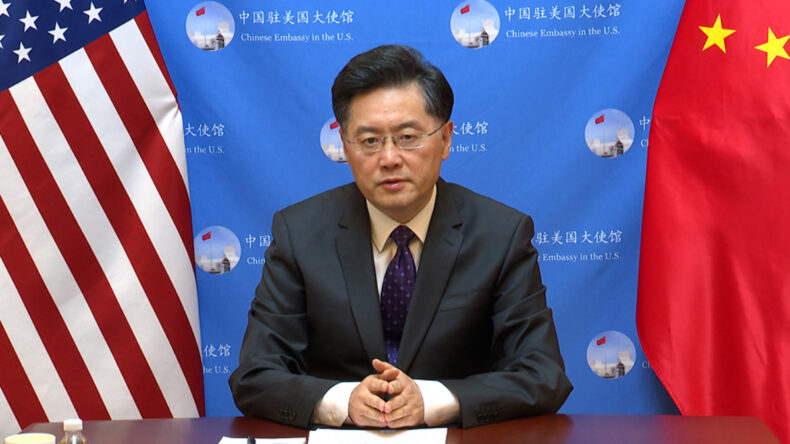Qin Gang, a former Chinese minister, was dismissed after it was discovered that he had an affair and fathered a child while serving as US ambassador, according to the Wall Street Journal. The tabloid stated on Tuesday that top authorities were informed in August that a Communist Party investigation into Qin turned up “lifestyle issues,” and it didn’t specify what those issues were. That phrase often refers to some form of sexual impropriety in the official Chinese lexicon.
Senior Chinese officials were informed that Qin had been involved in the issue during his time serving as China’s ambassador to the United States, according to a report. The encounter led to the birth of a child in the US, according to two sources who spoke to the publication.
The investigation is currently focusing on whether or not the affair compromised national security with Qin’s assistance. Due to the ideological rivalry between China and the US, its principal geopolitical and economic rival, Beijing has stepped up its efforts to safeguard the nation from external dangers.
The Beijing Foreign Ministry did not immediately respond to a request for comment on Tuesday.
Chinese Minister removed from ministerial position
China removed Qin from his ministerial position in July, just seven months after he began working there, making his time in that position the shortest ever. Without any justification, Qin was fired, and Wang Yi was given the job back.
The incident sparked concerns about President Xi Jinping’s judgement and the stability of the administration overseeing the second-largest economy in the world. These worries are being revived by Defence Minister Li Shangfu’s present unexplained absence, which comes amid media accusations that he is being investigated for corruption.
Individuals who spoke to the Wall Street Journal claim that important members of the nation’s ruling Communist Party are currently under investigation for their dealings with outsiders. They also said that China’s military’s top brass was also being investigated.

Few members of the Chinese government have risen through the diplomatic ranks as swiftly as Qin. His big break came in 2015 when he was given protocol control by the foreign ministry. He organised state visits to China for important dignitaries over that six-year period.
In that role, Qin most definitely gained access to Xi. He was visible standing behind the Chinese president in Beijing in 2017 during a meeting with the then-US President Donald Trump.
Qin was sent to Washington in 2021, but she is still largely unknown outside of diplomatic circles and the Beijing press corps. He readily adopted American culture and displayed a skill for public relations by attending a baseball game and riding in a Tesla Inc. with Elon Musk.
Additionally, he expressed moderation on controversial subjects, saying that if Beijing had been aware of Russia’s ambitions to invade Ukraine, it would have attempted to do so, and downplaying the likelihood of a conflict with Taiwan.
Is Xi Jinping’s government losing power?
The Chinese government under Xi Jinping does not appear to be functioning perfectly.
Unfounded reports regarding the extreme economic inequality in Chinese society have surfaced.
The system’s information control has kept the outside world from learning the truth about the situation.

The economic fallout from the international pushback in response to Xi’s assertive foreign policy highlights the social gap because economic rent has not been spread equally among the populace. Political fractures have recently shown, indicating that Xi may be losing control of the situation.
In any authoritarian regime, purges, enemy eradication, and even execution of opponents are frequent occurrences. The North Korean government model established by Kim Jong Un to maintain the dynastic system of leadership is a prime illustration of this phenomenon.
Recent abrupt changes to the country’s foreign and defence ministers are signs that not everything in Xi’s governance structure is going well.













